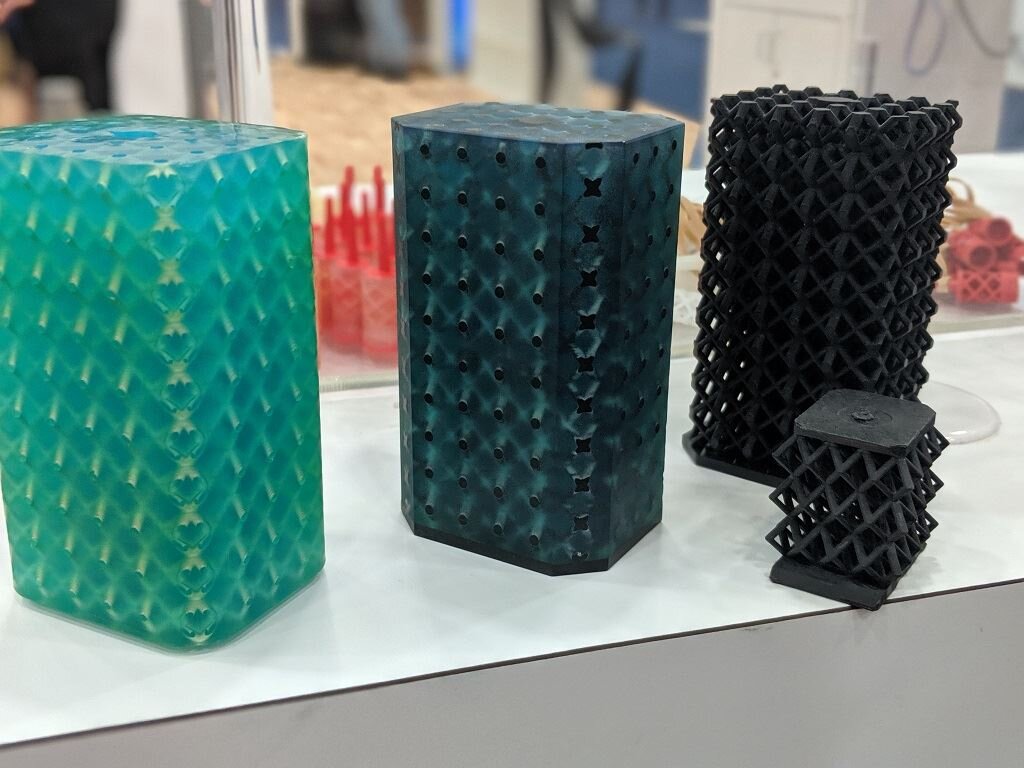![3D printed molds with injection molded lattice structures in a variety of materials [Image: Sarah Goehrke / Fabbaloo]](https://fabbaloo.com/wp-content/uploads/2020/05/AddiFabSGoehrkeRAPID2019_img_5eb08ffe7965e.jpg)
A new investment is deepening Mitsubishi Chemical’s relationship with Freeform Injection Molding.
The two were already close, as Denmark-based AddiFab (and its US-based arm, AddiFab Inc.) emerged earlier this year with a collaboration. Materials from Mitsubishi Chemical Holdings Corporation (MCHC) were formative to the many — many — types that the FIM process can handle.
This, indeed, is perhaps the single largest benefit of FIM; AddiFab Inc. CEO Carsten Jarfelt shares with us that “40,000+ materials” are compatible. These materials span a broad range, from the perhaps-expected thermoplastics — including many high-performance MCHC polymers — to more unusual rubbers, ceramics, and hard metals.
FIM brings together the benefits of complexity of additive manufacturing with the material handling and volume benefits of more traditional injection molding — neatly fitting the name, then, of “freeform” injection molding.
Investment
Today, AddiFab has announced an investment from MHCH’s US venture capital arm, Diamond Edge Ventures (DEV).
The investment amount and details of the transaction were not disclosed, but we can assume that it’s a significant boost to the AddiFab business.
“This investment and development relationship with the MCHC Group companies, a world-wide leader in advanced, high-performance polymer materials, will strengthen the ecosystem of support for AddiFab and their customers for the global deployment of Freeform Injection Molding. The collaboration with Mitsubishi Chemical will allow us to strengthen the Freeform Injection Platform while at the same time accelerating the pace of adoption of this transformative technology,” says AddiFab ApS Co-Founder and CEO Lasse Staal.
As with many investments into 3D printing companies these days, it isn’t just money giving AddiFab its next boost. The relationship is going deeper still. Materials work will of course continue as more MCHC offerings become “Qualified for FIM” but that’s certainly not the limit.
Veteran venture capitalist and DEV President Patrick Suel is joining the AddiFab Board of Directors, helping to guide the future of the company.
“Our investment in AddiFab reflects MCHC’s dedication to the 3D printing community. FIM gives customers the flexibility and speed of 3D Printing with the consistence and reliability of Injection Molding. The industry can now rely on an existing and independent supply chain of existing and proven materials. We have already brought the tried and trusted materials from the DIAKON, KyronMAX, Ketron, Tefabloc and Trexprene into the additive world created by FIM, and more will follow as a result of this collaboration,” says Suel.
As with any investment, the financial aspect is surely welcome as well. Without details disclosed on the deal, we can’t really make any assumptions at this point as to what the influx of money might mean to AddiFab’s next steps — but can assume that a press release wouldn’t have been issued were it a piddling token that wouldn’t poise the company for some planned next steps.
AddiFab is ambitious in its aims, a throughline in every conversation I’ve had with the company. They also have shown to be astute in reaching their goals, as a major and ever-closer relationship with MCHC and ever-expanding material compatibility underscore.
AddiFab is among the companies appearing this week at TCT Show. Kerry is on the ground at the show and sure to report back with more first-hand impressions from AddiFab and others.
Via AddiFab

